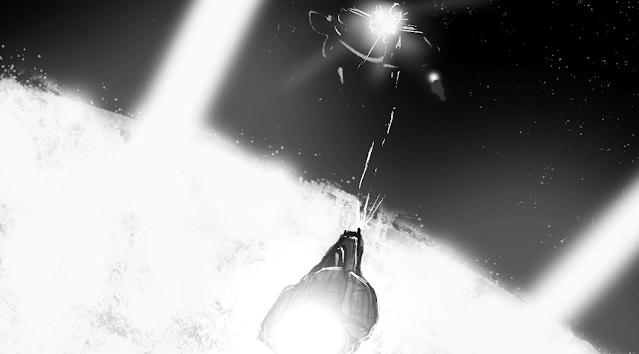What I Read in 2023
2023 was a year where I read a lot of short fiction - but I still made time for some novels.
Here are five books I loved.
Richard K. Morgan – Market Forces
Can't go past Richard Morgan for hard-hitting, gritty, ultraviolent cyberpunk. Exactly the level of corporate cynicism I needed to get me through the year.
Market Forces follows Chris Faulkner, a new employee at Shorn Associates. Shorn is a Conflict Investment firm - they look at unstable nations and wartorn failed states and choose sides to back, and in doing so, unlock significant investment opportunities. It is brutal, unapologetic, and painfully close to how some less scrupulous corporations operate today.
What sets this world apart, however, is the ingrained and ritualised violence within the corporate world. Chris' colleagues, the executives and management figures of Shorn and other big firms, are entitled to drive heavily-armoured luxury cars, vehicles which serve triple duty as mode of transport, blatant status symbol, and weapon of choice for duelling. Think Mad Max, but they're wearing a three-piece suit and have a boardroom lunch to attend.
T. R. Napper – Neon Leviathan
This year I made a concerted effort to read more of what I write: short fiction. It turns out that a lot of my favourite authors have short story collections.
Neon Leviathan is cutting edge stuff. Whether it's the sweat-soaked jungles of South East Asia or the brick and concrete dystopia of a post-capitalist Australia, Napper writes with such vivid detail and astute characterisation of both people and place. I cannot recommend this collection highly enough.
I've already written about T. R. Napper's first novel, Thirty-Six Streets, here. If you haven't read it, go read it - it's a stellar debut and a cracking piece of Australian fiction. I'm very keen to read what he writes next.
Robbie Arnott – Limberlost
I really loved Robbie Arnott's debut novel Flames - I don't think there is an author alive who is able to match Arnott's ability to capture the harsh beauty of the Tasmanian wilderness. That deftness is on display in this novel as well, and it's my favourite piece of Australian literary fiction for the year.
Limberlost is a meditation on masculinity, a personal mythology, and a hard look at the changing nature of Australia, all told through the eyes of a young boy growing into manhood as the world convulses in war. Ned's struggle to find satisfying meaning continues from his youth through to his old age, and it's a hauntingly beautiful work that stuck with me long after I put the book down.
Amal El-Mohtar and Max Gladstone – This is How You Lose the Time War
It would be remiss of me not to mention this book, particularly as it gained massive popularity this year. I do get to tell people that I knew it before it was cool (heh) but only by a month or so. I did not expect to love this book as much as I did - usually when things blow up online I remain sceptical, but this was an occasion where I was pleasantly surprised.
There's a lot of talk about 'hooks' in fiction writing, but nothing grabbed me quite like "burn before reading". The authors did a masterful job of playing the enemies-turned-lovers trope to its conclusion, without it feeling overworked.
This was a book I read cover to cover in a day, and then went back to revisit passages throughout the year. It's a remarkable work of art.
Arkady Martine – A Memory Called Empire
As someone who has a long and enduring love of different cultures, and someone who has lived and worked within the Sinosphere, A Memory Called Empire felt cuttingly honest. Thrust into a political murder mystery set against the backdrop of an enduring hegemony in the throes of a great transition, our protagonist Mahit Dmzare is forced to navigate the intricacies of language, culture, and the power that lies at their interstice.
There is a level of grandiosity present in Martine's writing that feels earned in this book. The prose is both sharp and luscious, and this was a joy to read from start to finish. The sequel, while enjoyable for different reasons, didn't quite make it onto this list. Still worth a read though!









Comments
Post a Comment